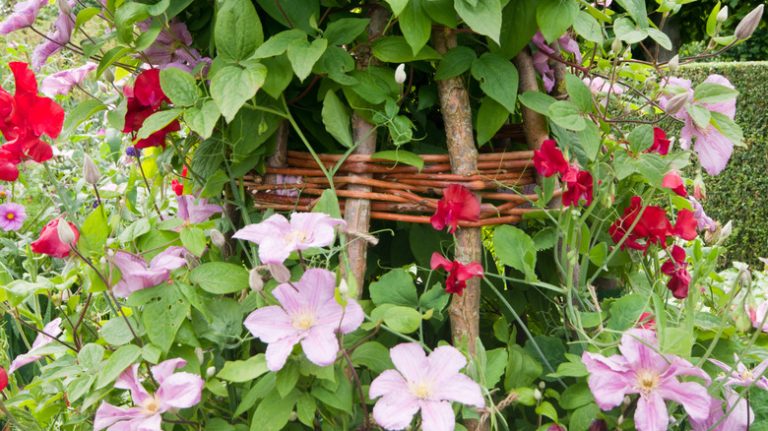Ants are typically drawn to houseplants for two main reasons: the presence of pests and the moisture that the soil provides. These factors make your houseplants the perfect environment for ants to burrow in. Adopting a multifaceted approach is the key to successful ant control. This includes natural solutions that are safe for your plants and the environment, as well as preventive measures to stop future infestations. From using common household items like vinegar and coffee grounds, to leveraging the natural pest control benefits of substances like diatomaceous earth and neem oil, there are various effective strategies to explore.
In addition to these solutions, understanding the importance of regular care and maintenance of houseplants cannot be overstated. Proper watering, soil health management, and routine pest inspections are pivotal in preventing ant infestations. These practices not only keep ants at bay, but also contribute to the overall well-being of your plants.
Get rid of any aphids
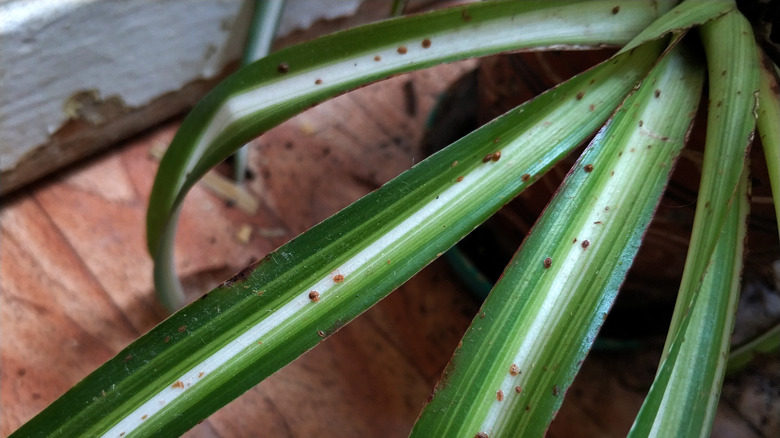
If you have ants in your houseplants, it might indicate you also have an aphid infestation. Ants are attracted to the sweet substance known as honeydew, which aphids excrete. In a way, ants farm aphids to harvest this sugary secretion, often leading to a symbiotic relationship detrimental to your plants. Understanding this connection is key to tackling both aphids and ants.
Manual removal of aphids is a direct approach. Gently brushing them off with a soft cloth or brush can reduce their numbers significantly, though this method is best when the infestation is small. When manual efforts aren’t enough, a blast of water can be your next line of defense. A forceful spray from a hose or spray bottle dislodges aphids, especially for plants that can withstand a bit of water pressure. This method, while simple, can be surprisingly effective in dislodging aphids and disrupting the ant farming process.
Nature can also lend a hand. You can keep your plant pots outside where ladybugs, lacewings, and other predators can feast on the aphids. However, keep an eye on weather conditions and potential outdoor pests to ensure the overall well-being of your plants. At times, these natural pest control methods may not suffice, and insecticides might become necessary. Opt for those that are effective against aphids, but gentle on the soil of your houseplants. Insecticidal soaps and horticultural oils are other options as they target aphids without harming beneficial insects.
Repot the plant
If you’re dealing with a severe ant infestation, repotting your houseplants helps. This method does more than just move your plant to a new container; it rejuvenates your plant and disrupts the ants’ living space. Start by gently removing your plant from its current pot — this is a crucial moment to inspect the root health and determine the appropriate size for a new pot. You can clean the old pot using bleach, ensuring it’s free from any ant residue, or opt for a new pot entirely. When selecting a new pot, ensure it has adequate drainage holes and offers the right amount of space for your plant’s growth. A pot that’s too large can create conditions like waterlogging, which is attractive to ants.
The most critical part of this process is to remove as much of the old, infested soil as possible, as disposing of this soil is key to destroying their habitat. If your plant has delicate roots, handle them with extra care to prevent any damage. After repotting, it’s essential to maintain proper care for your plant. Regularly inspecting your plants for pests will help in the early detection and prevention of future infestations. Bear in mind that repotting can be a significant change for your plants and may cause them stress. So, after repotting, allow your plant time to adapt to its new environment, being mindful of its specific needs in terms of light, temperature, and watering.
Mix in some diatomaceous earth
Helin Loik-tomson/Getty Images
Diatomaceous earth (DE) can be used as a natural pest control method. It is made from the fossilized remains of diatoms, a type of algae. These diatoms accumulate in the sediment of rivers, streams, lakes, and oceans over millennia. The silica-based skeletons of these microscopic organisms form DE, a fine, abrasive powder. This powder has microscopic, sharp edges that are lethal to insects, like ants. When they come into contact with DE, the abrasive action of the powder damages their exoskeletons, leading to dehydration and death. When applying DE for ant control on houseplants, targeting areas where ants are most prevalent is essential. This typically includes around the roots and on the soil’s surface. To apply, lightly sprinkle a thin layer of DE on the soil around the plant. Be cautious to avoid any direct contact with the plant’s leaves, as DE can absorb moisture and oils, leading to dryness and potential damage.
Despite its effectiveness, DE does have some downsides. It can harm beneficial insects, such as ladybugs, if they contact it directly. Ladybugs are also a natural pest control, since they feed on common plant pests like aphids and mites, so preserving them is essential for maintaining a balanced ecosystem. Therefore, using DE judiciously is advisable, focusing on infested areas and avoiding widespread application.
Add peppermint oil
Madeleine Steinbach/Shutterstock
Peppermint packs a punch with its strong scent and unique properties, making it a fantastic natural ant repellent. It’s safe for the environment and your home, providing a friendly solution to those pesky ant problems. The secret lies in its composition of alcohol, terpene, and menthol, which join forces to act as fumigants. This combination not only repels ants, but also masks the scents that usually attract them to your plants, creating an olfactory barrier. Using peppermint to keep ants away is straightforward. You can mix its oil with water to make a spray, then apply it around your plant’s base and soil. Alternatively, you can also try sprinkling crushed peppermint leaves around your plant pots to act as a barrier.
Remember that the magic of peppermint isn’t everlasting. You’ll need to reapply it regularly to keep those ants at bay. Try to integrate the treatment into your routine to ensure continuous protection. Although it may work well for small infestations, peppermint might need a little backup if you’re dealing with a larger or more stubborn ant problem. In this case, try to combine it with other ant control methods to boost its effectiveness.
One last tip: Be mindful of the plants you’re using peppermint with. Some plants might not react well to peppermint oil, especially if it’s applied directly. It’s always a good idea to test a small area first or dilute the oil to keep your plants happy and stress-free.
Add neem oil
Ninetechno/Getty Images
When fighting against ants, using neem oil on houseplants is a smart idea. It is a natural insecticide, containing compounds like azadirachtin and salannin, which makes it a deterrent for these unwelcome guests. The way neem oil works is quite intriguing: It suffocates insects and disrupts their hormonal systems. Additionally, it’s known for disrupting the pheromone trails ants use for navigation, thereby deterring them from returning to your plants. Applying neem oil requires some finesse. It’s typically diluted with water and soap and then sprayed onto the plant’s base, where ants are likely to be present. It’s important to use a quality neem product and to time your application carefully. If your plant is in the sun, it’s best to wait until the evening to apply it as otherwise it may burn your plant.
Neem oil’s effectiveness also extends beyond just ant control. It can help manage various plant diseases, making it a valuable addition to your plant care toolkit. Regular use and following the recommended guidelines can keep your houseplants healthy and free from various pests, including ants. However, despite its many benefits, neem oil isn’t a cure-all. It may not address large infestations or the root causes attracting ants, such as excess moisture or other pests. Hence, it’s best used in a broader integrated pest management strategy.
Sprinkle coffee grounds
Ryanjlane/Getty Images
Turning to coffee grounds is a smart move when you’re dealing with ant infestations in your houseplants. The aromatic properties of coffee play a significant role in repelling ants, as the strong smell interferes with the ants’ ability to follow scent trails, deterring them from your plants. However, it’s worth mentioning that using the coffee grounds alone will only help repel certain ants and won’t necessarily kill them. Nevertheless, by using it in combination with gel bait, you can amplify the coffee grounds against ants for an insecticidal effect. Research found that when mixed in a gel bait, certain types of coffee — particularly Arabian coffee — are highly successful in controlling ants, including common species like ghost ants, big-headed ants, and pharaoh ants (via Pertanika Journal of Tropical Agricultural Science). Coffee grounds also offer additional benefits for your houseplants. They can improve soil structure and aeration, promoting healthier root growth.
Using coffee grounds is simple. You can spread them around the base of your plant pots or incorporate them into the top layer of soil. It’s important to use them sparingly to avoid heavily affecting the soil’s acidity levels. Overuse can lead to soil acidification, which might not be suitable for all plant types. Furthermore, the caffeine content may affect the growth of some specific plants, like tomatoes.
Place the pot on a bowl with water
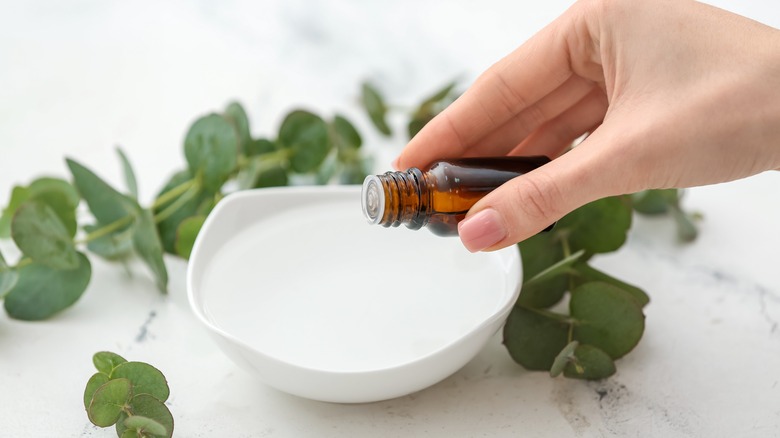
Pixel-Shot/Shutterstock
Another interesting method to deter ants is to set up a water barrier. It’s a surprisingly effective, straightforward, and chemical-free approach. The principle behind this technique is to exploit the natural reluctance of ants to navigate through water, which will act as a sort of moat. To set up the barrier, choose a tray wider than your plant pot and fill it with water. The bowl should be shallow enough to prevent water from seeping into the pot’s drainage holes, which could lead to overwatering and root rot. It might also help to add some peppermint essential oil to the water.
While this method is helpful, it does require regular maintenance. Since the water in the tray will be standing still, it needs to be changed frequently to prevent it from becoming a breeding ground for mosquitoes or attracting other pests. This means regularly emptying and refilling the tray with fresh water. Another point to consider is the potential for increased humidity around the plant. Some plants thrive in humid environments, while others may suffer. It’s important to understand your plant’s specific needs and ensure that the increased humidity will not adversely affect its health.
Don’t use rich soil
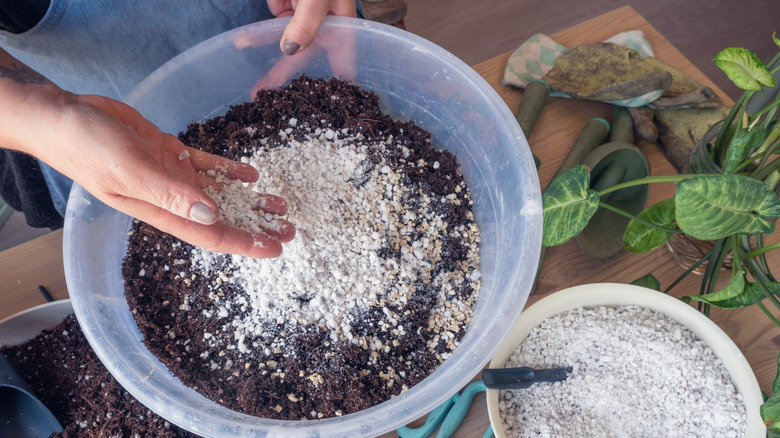
Cemselvi/Getty Images
Ants are often drawn to the moisture and nutrients found in rich, organic soils. By tweaking the soil composition, you can make the environment less appealing to these pests. Organic-rich soil tends to retain more moisture and can decay, both of which are desirable things to ants. You can decrease these by using a soil mix with less organic content. However, striking a balance is important, as too little organic matter may not suit all plants. Also, consider supplementing the soil with alternatives that promote good drainage and aeration. For example, you can mix materials like vermiculite with your regular potting soil to improve its structure without making it overly appealing to ants.
Vermiculite is a lightweight, sterile medium that is a solid choice for pest control since it doesn’t attract insects. Its ability to hold and release water as needed is also beneficial for houseplants like Boston ferns and peace lilies that thrive in consistently-moist conditions. Adding vermiculite to your plant’s soil helps keep pests away and ensures your plants get the continuous moisture they need for optimal growth. That being said, it’s important to monitor your plants closely to ensure the soil isn’t staying too wet.
Use white vinegar
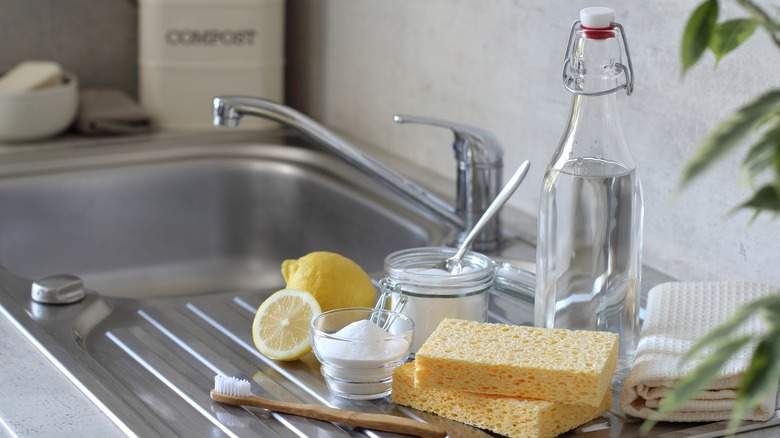
Aygul Bulte/Shutterstock
The efficacy of white vinegar for controlling bugs in houseplants is rooted in its strong smell and acidic nature. When applied to the soil or around the plant pot, vinegar masks the scent trails that ants rely on to find food sources and navigate. This disorientation is a key factor in keeping ants away from your houseplants. However, using white vinegar requires careful consideration, as it can alter the soil’s pH level, which might harm the plant.
In a mild scenario, this could result in a slight leaf burn, but in extreme cases, it could even cause the entire plant to die. To prevent this, it’s best to dilute the vinegar with water before applying it. A solution of equal parts water and vinegar is typically effective while being gentle enough for most plants. The application of the vinegar solution should be targeted. Focus on the areas where ants are most active, such as the base of the plant or along the pot’s rim.
After you apply the vinegar, keep a close watch on your plants. Pay attention to any shifts in the overall health of your plants, from the stem to the leaves. Look out for wilting or yellow spots. If you notice any negative changes, it’s important to tweak how often and how much vinegar you use. Regular checks will also guide you in maintaining the delicate balance needed.
Use different kinds of citrus
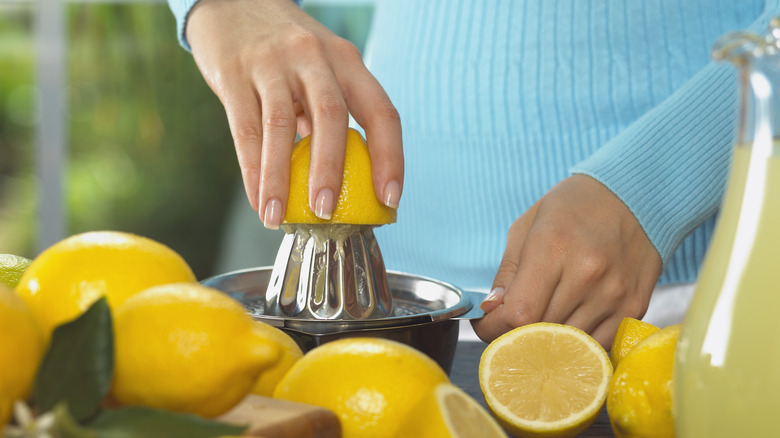
Burke/triolo Productions/Getty Images
Citrus fruits, particularly lemons, contain citric acid, which ants don’t like. The effectiveness of citrus in repelling ants is also due to its strong, pungent aroma, which masks the scent markers that ants use to navigate. This method offers a safe, non-toxic way to keep ants away, making it ideal for households with pets and children. While citrus is a great natural deterrent, it is important to use it judiciously. Similar to vinegar, excessive application of lemon juice or overuse of peels can alter the pH of the soil, which might not be favorable for some plants. Therefore, moderation is key when employing this method. A few strategically placed lemon peels or a light spritz of diluted lemon juice around the plant can be effective without causing harm to your plants.
It’s also worth noting that, as with many natural ingredients, citrus-based repellents may offer only temporary relief from ant infestations. Therefore, it may be necessary to regularly replace the lemon peels or reapply the juice. Additionally, combining this method with other ant control strategies can enhance the overall results.
